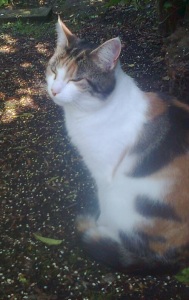 As I sit at my keyboard, I am looking at my calm and contented 3 year old calico cat, Tilly. Apart from the shaved area on her flank, you wouldn’t know anything had ever been different. Yet last week, she came close to dying from acute kidney injury.
As I sit at my keyboard, I am looking at my calm and contented 3 year old calico cat, Tilly. Apart from the shaved area on her flank, you wouldn’t know anything had ever been different. Yet last week, she came close to dying from acute kidney injury.
I had come home after a long day spent running workshops for health services in Dorset. It didn’t take my physicianly training to realise that Tilly was in big trouble. Her legs couldn’t hold her up, she was probably delirious, and she could barely lift her head to drink.
It was 8 pm on a Thursday, and I knew that veterinary practices wouldn’t be open. But something had to be done. We found the one out of hours vet covering the whole of West Berkshire and called them for advice. By 10 pm, the cat was at the surgery and seeing the on call vet. She was highly professional, kept us informed, and was able to perform a range of blood tests on site and give us the results within minutes. Tilly had acute kidney injury, almost certainly due to volume depletion—a condition I manage several times whenever I am on call for acute medicine.
With parallels to my day job, Tilly was given calcium, had potassium reduction treatment, was started on intravenous fluids, catheterised, and admitted for overnight observation. We were told to return first thing in the morning so we could take her to the vet she is registered with. The next day she was still unwell, although the biochemistry was improving. We collected her and got her to the usual vets, who were waiting for her with a full handover already in place.
 They admitted her for a further two nights (Saturday and Sunday) until she was fully re-hydrated, with her urea and creatinine blood levels down to normal, and the gastrointestinal upset that had caused the kidney injury resolved. During this time she underwent imaging of the renal tract and testing for gastroenteritis—all on site. We took her home on Sunday morning at a pre-arranged time. A follow-up appointment was booked for 48 hours after we took her home.
They admitted her for a further two nights (Saturday and Sunday) until she was fully re-hydrated, with her urea and creatinine blood levels down to normal, and the gastrointestinal upset that had caused the kidney injury resolved. During this time she underwent imaging of the renal tract and testing for gastroenteritis—all on site. We took her home on Sunday morning at a pre-arranged time. A follow-up appointment was booked for 48 hours after we took her home.
I know it’s just one story, but the saga made me reflect on the parallels between my world as an NHS doctor and that of the vets—between the service they offer and the one we do.
The positives were many. All four vets we dealt with were thorough, highly skilled, and professional—as were their nursing colleagues. The small veterinary practice maintained an on call presence for “inpatients” throughout the weekend, with vets on an on call rota. We were given three or four unsolicited calls each day to update us on the cat’s progress and to negotiate with us any further treatment or investigation. (This proactive, unbidden updating by email or phone call is something that, in my experience, relatives of our older patients would actively welcome—with frequent complaints that “no-one has updated me,” even when no one has asked to speak to a doctor or come onto the ward. But we just don’t have the time in current job plans.)
All the staff we dealt with gave at least a great impression of really enjoying their work, of wanting to be there, of caring for the animals and wanting to reassure their owners. I have no idea if vets are happier in their work than NHS doctors (or just less busy), but they sure look like they are, which is very reassuring when you are worried about your animal. And the blood tests, imaging, and fluid resuscitation were all carried out at the bedside and reported to us instantaneously. At no point were we made to feel that our concerns or questions were unwelcome. And of course, we have our much loved cat alive and back at home.
So far, I have described a first rate urgent response, immediate near patient testing, regular senior review, seven day service provision, a genuine concern for service users, and proactive open communication—as well as responses built around the convenience and wishes of pet owners. And we have never had a problem getting an appointment at the vet on the same day or at a time we could get there.
“So far so good,” you say, “but the downsides—there must be some?” Indeed so. And, in the words of Jessie J, “It’s all about the money.” I am under no illusion that some of the real customer focus and professionalism in vets must be driven by the fact that they rely so clearly on payment from pet owners for their business: it focuses the mind. The fact that services aren’t free at the point of delivery probably increases responsible service use by those owners.
We are fortunate to have both our cats insured for up to £4000 a year of veterinary fees. Thank goodness!
That one night in the emergency vet cost £940, with a £250 deposit upfront. The subsequent stay in the usual vet was another £600. And we had to fork out from our own accounts and then reclaim from the insurance company. Every test and every intervention was an item on a bill.
Anyone who couldn’t afford pet insurance, or who couldn’t afford to pay the initial cost before claiming it back, would have lost their pet in these circumstances or avoided going anywhere near the out of hours centre.
My final reflection is that in the NHS patients and the public have great confidence in the one place where the lights are on 24/7 —the local emergency department—which they can use free of charge. Yet we react by penalising these departments and adjacent acute medical units: creating tariffs aimed to keep people away, and which lose hospitals income on acute activity driven by the public’s confidence in the services.
By contrast, in the land of small animal veterinary surgery, they can trade their way into tidy profits by offering acute services when all others have closed. And, of course, when we get the usual calls by working professionals, to see their GP at 8 or 9 pm on a weekday evening, we should remember that no other profession is expected to provide routine services at unsocial hours. Try getting your conveyancing or your tax accounts done at 9 pm, and see how far you get.
Professor David Oliver is a consultant geriatrician and acute physician, a visiting fellow at The King’s Fund, and the president elect of the British Geriatrics Society.
Competing interests: None declared.
